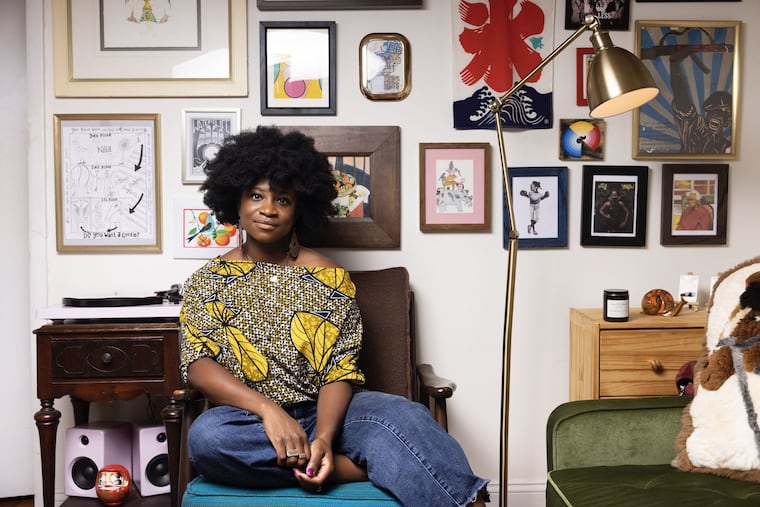Speak its name: The director of a play about West Philly’s Black Bottom talks about the power of community and living history
A Q&A with Brett Ashley Robinson, the director and creator of “Resilient: Black Bottom,” that opens at Drexel Theater on Friday.

Even though Brett Ashley Robinson has lived in Philadelphia for nearly a decade and had heard of West Philly’s Black Bottom neighborhood, she didn’t know much about its story.
But when the Drexel Theater program asked her to direct a play about the neighborhood upon which the university now sits, Robinson dove in — researching and talking with people from Black Bottom, and guiding her students to do the same. Together they learned how the expansion of University City demolished a vibrant Black middle-class community, with little regard for the people in it.
They learned about what it means to those who still carry the memory of Black Bottom with them.
Robinson spoke with The Inquirer about the play, Resilient: Black Bottom — which opens tonight at 8 p.m. — as well as about the neighborhood itself, building community, and how to start protecting communities that are still here.
This conversation has been edited and condensed for clarity.
Why is the story of Black Bottom an important one to tell? Why did it resonate with you?
It talks about the way we define progress when it comes to Black communities and Black bodies. I wonder what it means to have a thriving community that’s displaced and forcibly removed in the pursuit of greater education.
How are we transforming cities in the name of progress, and when we are transforming cities, who are we actually accountable to?
I’m not a native of Philadelphia. So when I enter a community, it’s important for me to be invested in that community, for what it is and the people who are there. And to not insist that my way of life is the way to live.
It’s valuable to share [this] story. It’s valuable to get to know your neighbors. It’s valuable to be engaged in discourse. It’s valuable to be a part of the community, [as] opposed to a person who comes to a place just to take, or for it to be of service to you.
» READ MORE: BLIGHTED - How The Inquirer covered the clearing of West Philadelphia’s Black Bottom
What did you and the students learn about Black Bottom as you researched and talked to people who grew up there?
It feels really important to speak the neighborhood’s name, to remember that it was a real community, to remember that real people lived there and that those people had very full and complex lives. That they were a real community and a neighborhood.
We’ve gotten a lot of positive response about the idea of talking about Black Bottom. I know that that doesn’t necessarily sound like the most novel piece of information to take away, but I do think that there’s something about our history, where if there’s something that we feel uncomfortable with, it’s easy to be able to turn your eyes away.
And I think that what I’ve learned is that to talk about the history is to honor the history. It doesn’t rectify the history, but it does help us include it in our decision-making in the future.
One of the unique things about this production is that after each show, you’ll have a discussion with someone from Black Bottom, like Walter Palmer. Why did you decide to include them this way?
It’s a living history. So there are people who know so much about Black Bottom who are still alive and still available to talk.
I think people will be craving discussion. And the hope is that the second half of the show not only teaches you a little bit more history but also invites you to participate in discussion and to ask questions and to feel empowered to leave [here] being able to talk about this neighborhood, to be able to talk about this community in a way that maybe you weren’t able to before.
So our hope is that by the end of the [play], you feel called to curiosity and by the end of the show, post-[discussion], you feel called to action.
The larger forces behind gentrification and expansion that drove out Black Bottom aren’t going away anytime soon. What do you think will happen to the communities of color in Philly that are still here?
I don’t believe for a second that Philadelphia will become a place where we are nothing but CVSes and Acmes. But, I believe that that comes by caring about the people who you see and you meet, and to invest in getting to know them.
I do think that it is hard to slow the rampant expansion of Philadelphia. But I think the difference between transformation and gentrification is — who is invested in the survival and the thriving of this community?
Who is coming into this community, willing to be a member [of it], and who is coming into this community just to take from its resources?
I’m optimistic about Philadelphia. I am not pessimistic.
Resilient: Black Bottom opens Feb. 24, 2023 at 8 p.m., and runs Feb. 25 and March 2-4 at 8 p.m. and Feb. 26 at 2 p.m. at Drexel University’s URBN Annex Black Box Theater.